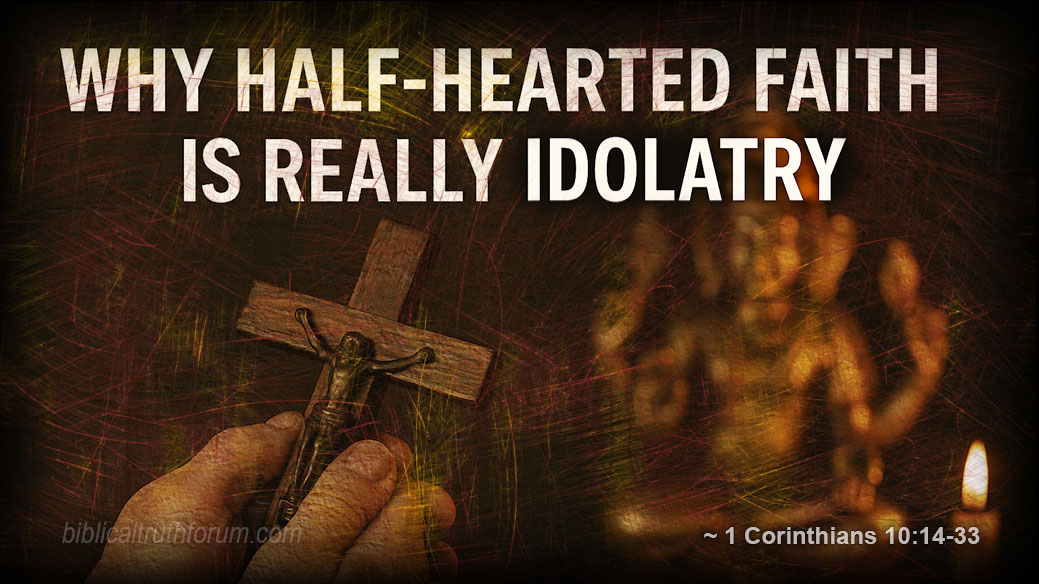Why Half-Hearted Faith is Really Idolatry
1 Corinthians 10:14-33
Idolatry seems like a thing of the past. It must have been a problem for ancient people, those who bowed down to carved images in the shadows of some dimly lit temple. The Bible would agree. “Therefore, my beloved, flee from idolatry,” Paul instructs (1 Corinthians 10:14). To flee is to run and not look back. Paul wants no half-way measures, no middle ground for compromise. Idolatry is not always as clear as graven images and gold. It is more subtle, but no less real. It can show up in the love of money, or an obsession with self, or devotion to entertainment, or a craving for approval. Anything that dislodges God from His rightful place in our hearts is an idol.
Paul calls our attention to the Lord’s table. The bread and the cup point to our union with Christ, His body broken, His blood shed. To eat and drink is to say, “This is my one and only Lord. He is my life, and I am His” (1 Corinthians 10:16–17). Then, with stark contrast, Paul draws a line in the sand. Pagan sacrifices, he reminds us, are not a neutral matter. They are offered “to demons and not to God” (1 Corinthians 10:20). It is not simply the superstition of the ignorant, it is spiritual warfare. You cannot drink the cup of the Lord and the cup of demons. To dabble in both is to give “ground for the jealousy of the Lord” (1 Corinthians 10:21–22).
This is an ax Paul drives into our 21st century world. How many people are trying to have it both ways, to worship God on Sunday, and then drink deeply at the world’s table for the rest of the week? We want God’s blessing without surrendering our secret sins. We want His protection without forsaking the compromises that get in the way of an authentic life in Christ. We want the perks of grace without paying the price of discipleship. But Paul leaves no room for gray areas. You cannot sit at two tables.
Paul now addresses the matter of freedom. “All things are lawful,” but not all things build up (1 Corinthians 10:23). Christ has set us free, but true freedom is not the self-worshiping pleasure it is often made out to be. It is love in service to others. Paul pleads, “Let no one seek his own good, but the good of his neighbor” (1 Corinthians 10:24). This means that we cannot use our liberty as a pretext to run roughshod over someone else’s conscience. Even the ordinary activities of eating and drinking, Paul argues, are not our own to do with as we please. Rather, we are to do all things for the glory of God (1 Corinthians 10:31).
The call is piercing. Does the way we spend our money glorify God? Do our conversations echo the holiness of His name? Do our choices make it easier or harder for people to see the gospel at work in our lives? Is what we do a stumbling block to unbelievers, or a help? Paul’s own mission statement boiled down to this: “I try to please everyone in everything I do, not seeking my own advantage, but that of many, that they may be saved” (1 Corinthians 10:33). His life was not a dogged defense of his rights. It was a laying down of them, again and again, so that the world would see Christ.
The word is clear. We cannot belong to Christ and yet love the things of this world. We cannot live for self and the gospel at the same time. Whatever we do, eat or drink, work or rest, or spend our time in conversation, must be done for the glory of God. One table. One cup. One Master.
Nehemiah 11:1-12:26
1 Corinthians 10:14-33
Psalm 34:11-22
Proverbs 21:14-16
Today’s Scripture – Read
Listen to Today’s Scripture
New Testament: 1 Corinthians 10:14-33
Summary: Warning Against Idolatry, Do All to the Glory of God
…whatever you do, do all to the glory of God. —1 Corinthians 10:31
In the Scriptures, the great miracle of the incarnation slips into the ordinary life of a child; the great miracle of the transfiguration fades into the demon-possessed valley below; the glory of the resurrection descends into a breakfast on the seashore. This is not an anticlimax, but a great revelation of God.
We have a tendency to look for wonder in our experience, and we mistake heroic actions for real heroes. It’s one thing to go through a crisis grandly, yet quite another to go through every day glorifying God when there is no witness, no limelight, and no one paying even the remotest attention to us. If we are not looking for halos, we at least want something that will make people say, “What a wonderful man of prayer he is!” or, “What a great woman of devotion she is!” If you are properly devoted to the Lord Jesus, you have reached the lofty height where no one would ever notice you personally. All that is noticed is the power of God coming through you all the time.
We want to be able to say, “Oh, I have had a wonderful call from God!” But to do even the most humbling tasks to the glory of God takes the Almighty God Incarnate working in us. To be utterly unnoticeable requires God’s Spirit in us making us absolutely humanly His. The true test of a saint’s life is not successfulness but faithfulness on the human level of life. We tend to set up success in Christian work as our purpose, but our purpose should be to display the glory of God in human life, to live a life “hidden with Christ in God” in our everyday human conditions (Colossians 3:3). Our human relationships are the very conditions in which the ideal life of God should be exhibited.
Overview: 1 Corinthians
1 Corinthians 10-11
Views: 8



